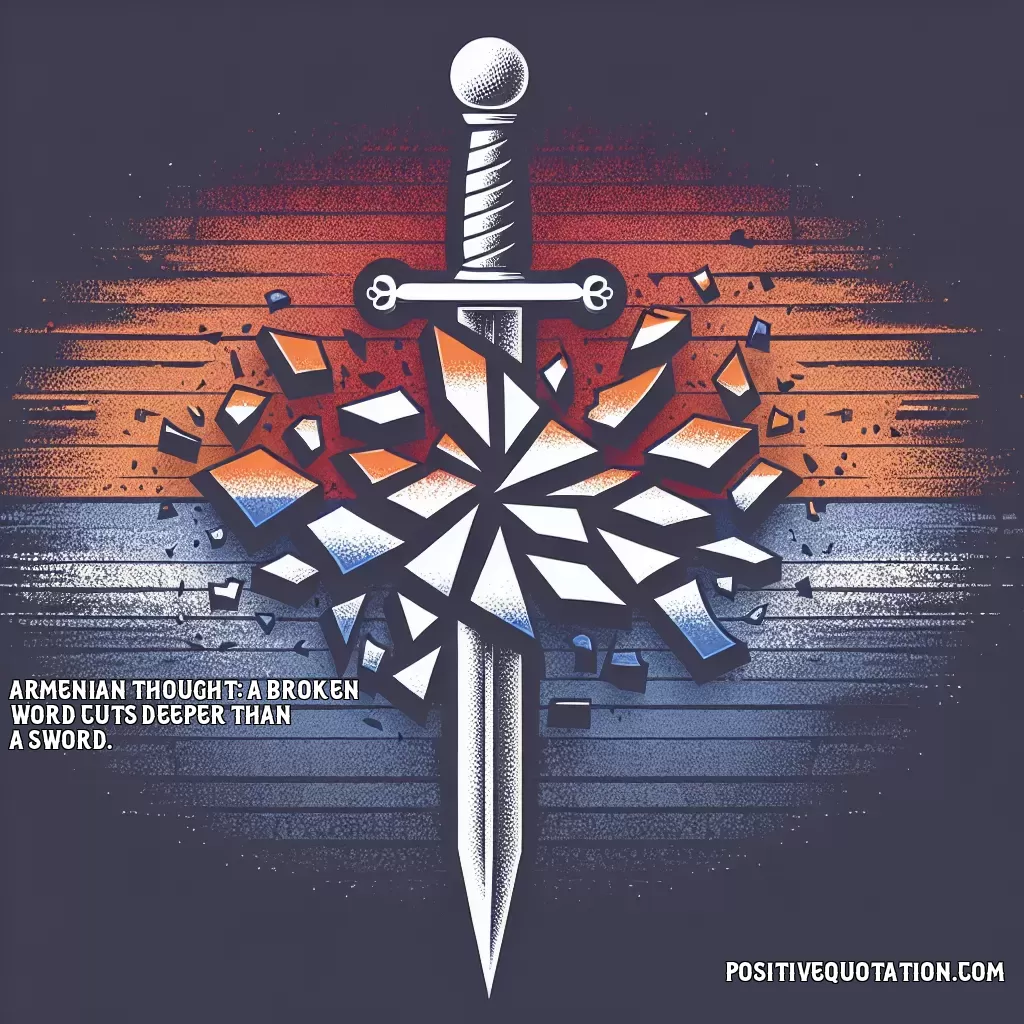
Armenian Thought: A broken word cuts deeper than a sword.
Author: Khachatur Abovian
👁️ 7 views
The Armenian proverb “A broken word cuts deeper than a sword” conveys the profound impact that words can have on individuals and relationships. At its core, this saying emphasizes the power of language, underscoring that words, once spoken, cannot be retracted. When promises or commitments—whether personal or professional—are broken, the emotional and psychological damage can be far greater than any physical wound. The imagery of a sword suggests physical harm, which is often visible and can heal over time. In contrast, a “broken word” refers to betrayal, deceit, or the failure to fulfill one's promises, leading to feelings of disappointment, mistrust, and deeply embedded hurt. These emotional wounds can be much more enduring and challenging to heal than physical ones, as they often touch upon essential elements of human connection, such as trust, respect, and integrity. In social and cultural contexts, this proverb serves as a cautionary reminder to uphold one’s word and to communicate truthfully. It highlights the responsibility individuals have in their interactions with others, promoting honesty as a fundamental value. By honoring our words, we build stronger, more reliable relationships and communities. Moreover, this saying resonates across various cultures, reflecting a universal truth about human interactions. It acts as an ethical guide to remind people that while actions carry weight, words possess the profound ability to uplift or destroy. As such, they should be used with care and sincerity to avoid inflicting emotional harm that might linger long after the words have been spoken. This aphorism ultimately challenges its audience to consider the significance of their spoken commitments and to appreciate the integrity of maintaining them.
Quote By: Khachatur Abovian
Khachatur Abovian, born on March 15, 1809, in the Armenian village of Kanaker, near Yerevan, is a notable figure in Armenian literature and a pioneering advocate for modern Armenian identity. Abovian's early education took place in the traditional Armenian school system, and he later pursued advanced studies in various subjects, including philosophy, history, and literature. His exposure to European Enlightenment ideals profoundly influenced his literary and political outlook.
Abovian is best known for his novel "Wounds of Armenia" ("Vordan Karmir"), published posthumously in 1858. This groundbreaking work is often regarded as the first modern Armenian novel and marks a significant shift in Armenian literature from classical to modern themes. In "Wounds of Armenia," Abovian captures the struggles and aspirations of the Armenian people, depicted against the backdrop of social and political turbulence. The novel's vivid narratives and characters reflect the unique cultural identity of Armenians and address the challenges faced by marginalized communities within the Russian Empire.
In addition to his literary contributions, Khachatur Abovian was an ardent nationalist. He actively participated in the cultural and political movements of his time, advocating for Armenian education and the preservation of Armenian heritage. His writings emphasized the importance of a unified Armenian identity, and he called for reform and modernization within Armenian society. Tragically, Abovian's life was cut short; he disappeared under mysterious circumstances in 1848, likely due to his outspoken views and the political climate of the time.
Despite his untimely death, Khachatur Abovian's legacy lives on. His pioneering spirit and dedication to Armenian culture have inspired generations of writers and activists. Today, he is celebrated not only as a foundational figure in modern Armenian literature but also as a symbol of national resilience and the quest for self-expression in the face of adversity. Abovian's contributions continue to resonate in the hearts of Armenians worldwide, ensuring his place in the annals of both literature and cultural history.